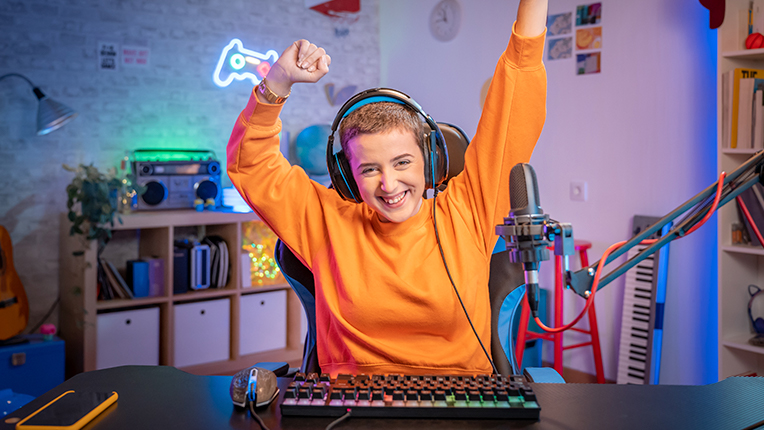Over the last few decades, the video game industry has undergone a dizzying transformation, going from being mere arcade games to providing immersive and credible experiences. In addition to their function as a source of fun, video games have proven to have enormous potential in the educational field. Specifically, educational video games are revolutionizing the way young people acquire knowledge and explore their environment. Let’s discover how educational Video Games Stimulate the Mind!
Boost motivation with educational video games
Educational video games stimulate the mind and can be a powerful tool to enhance motivation in learning. Motivation is a key factor for success in education, and there are different types of motivation that can be leveraged when using educational video games.
At Kidmons, we offer a selection of educational video games. He goes on the web and discovers games like “Coloring Book”, “Puzzle for Kids: Wonders” or “Simon Memorize”.
Here we see some strategies to foster motivation and the types of motivation that we can try to work on:
1. Intrinsic Motivation:
Choice and autonomy: Allows students to choose what games they want to play or how they want to approach challenges within the game. This gives them a sense of control and autonomy.
Internal Rewards: Design games that provide intrinsic rewards, such as the pleasure of learning, the satisfaction of overcoming a challenge, or the curiosity to discover more.
2. Extrinsic Motivation:
External Rewards: Use in-game reward systems, such as points, medals, or unlockable levels, to reinforce desired behavior and learning progress.
Competition: Introduce competition elements, such as leaderboards, for students to compete against each other and strive to improve.
3. Social Motivation:
Collaboration: Create games that require collaboration between players, which encourages teamwork and social interaction.
Sharing achievements: Allows students to share their achievements on social networks or with their friends, which can increase their motivation by receiving recognition from their peers.
4. Achievement Motivation:
Clear Challenges and Goals: Set clear goals and challenges in the game so that students feel a sense of accomplishment in achieving them.
Effective Feedback: Provide immediate, specific feedback so students know how they are progressing and what areas they need to improve.
5. Recognition Motivation:
Achievement Systems: Implement in-game achievement systems that recognize and reward milestones achieved by students.
Praise and Recognition: Celebrate student achievements in and out of the game, whether through in-game or classroom congratulations.
6. Belonging Motivation:
Community: Fosters a sense of community among students playing the same educational game, allowing them to share experiences and advice.
Study groups: You can promote the formation of study groups in which students can collaborate and learn together through play.
It is important to remember that motivation strategies may vary depending on students’ age and individual preferences. Educational video games must be carefully designed and consider specific learning objectives to be effective in fostering student motivation and engagement in the learning process.
Playful Elements that Stimulate Learning:
The playful elements in educational video games stimulate the active participation of children. Players must make decisions, solve puzzles, and face challenges, which engages their minds and gives them a sense of accomplishment. This constant interaction keeps children engaged as they feel like they are in control of their learning.
Additionally, these games often offer rewards, achievement recognition, and immediate feedback that reinforce the learning process. Mistakes are seen as opportunities to learn and improve, encouraging perseverance and self-confidence in children.
Skill Development with Video Games:
Educational games play an essential role in developing skills in students. These skills, such as critical thinking, problem solving, creativity, effective communication, and collaboration, are essential for success in an increasingly digital and globalized world.
In educational games, students face challenges that require critical thinking and problem solving to advance. They often must strategize, make informed decisions, and learn from mistakes, which improves their decision-making and critical thinking skills.
Creativity is also encouraged, as games often allow students to explore and experiment in virtual environments. Communication and collaboration are essential skills in many games, especially those that involve interacting with other players online.
In summary, educational games are an effective tool for developing skills of our era, as they offer an interactive and immersive learning environment that promotes the acquisition of these skills crucial for success in today’s world.
Conclusion
In conclusion, educational video games play a significant role in the mental stimulation of students. These games actively engage the players’ minds by combining playful elements with learning objectives. They require decision making, problem solving and constant adaptation to new challenges, which encourages critical thinking and mental agility. Additionally, immediate feedback and intrinsic rewards motivate students to persevere and learn from their mistakes. In an increasingly technology-focused world, educational video games offer an effective platform to promote cognitive development and prepare young people for the challenges of the 21st century.





